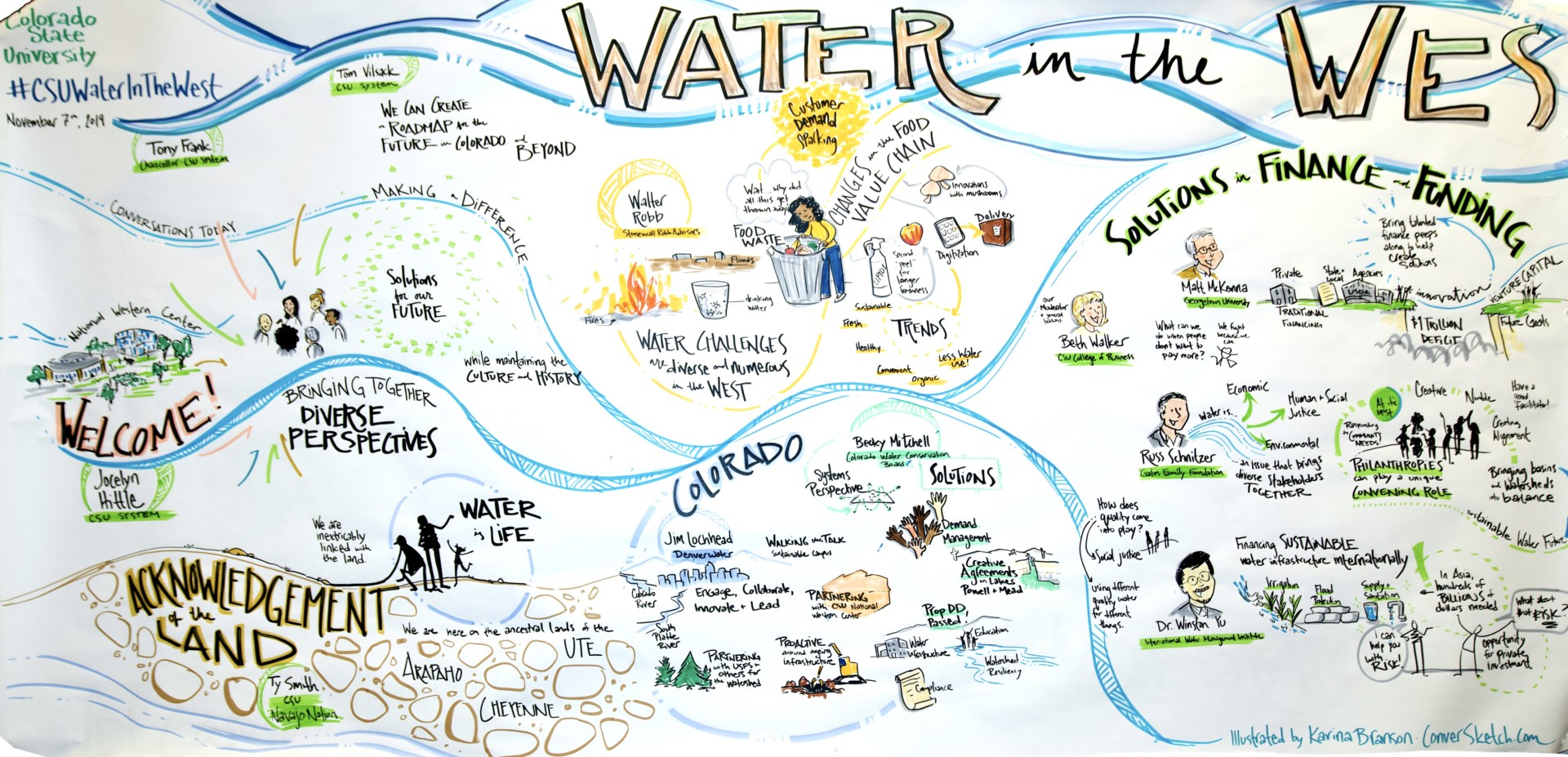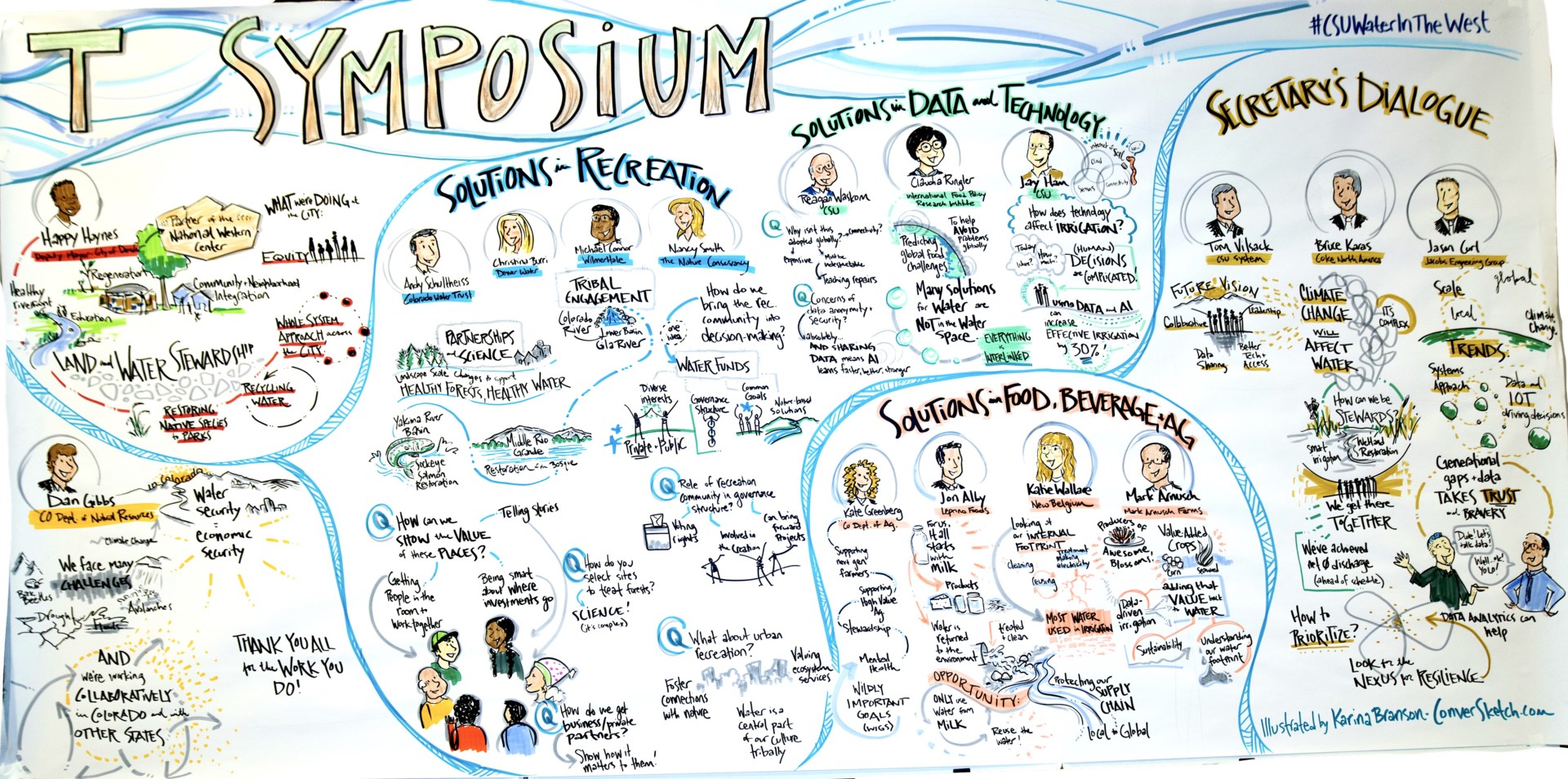Photography by Michael Hecker, Emery Media House.
After a bomb cyclone postponed the 2019 Water in the West Symposium, the sold-out crowd convened today at the Gaylord Rockies Resort and Convention Center to discuss solutions to a broad range of water-related challenges.
The Symposium, a preliminary program offering of the Colorado State University System campus at the future National Western Center, drew more than 375 people from across sectors — from water management to conservation to agriculture — to hear from 26 expert speakers from across the country.
“Water issues are very difficult, but we’re confronting a very serious issue here. The work you do here today will impact not just this great state, region, and country – it will inform what happens in the rest of the U.S. and globally,” said Tom Vilsack, former U.S. Secretary of Agriculture and special advisor to the CSU System.
Walter Robb, former co-CEO of Whole Foods Market and founder of Stonewall Robb Advisors, was the event’s keynote speaker and largely focused on food trends, including the increasing consumer desire for sustainably sourced food. Data show that millennials lead the way in making sustainable buying choices, but overall consumer behavior indicates roughly one-quarter of consumers will purchase a product based on sustainability.
“Sustainability – however you define it – is increasingly a measure of success, and will continue to be,” Robb said. “The customer is driving this revolution.”
While roughly 80 percent of food currently comes from 12 plants and five animals, the future of food will be more diverse, more delicious, and more sustainable, Robb said.
“We’re seeing nothing short of a revolution in today’s food value chain… how do we continue to innovate across the supply chain?”
Symposium panels focused on solutions, with topics across finance, recreation and the environment, food, beverage, and agriculture, and data and technology.
In early 2020, the CSU System will break ground on three buildings as part of the National Western Center campus near the intersection of interstates 25 and 70, a 250-acre redevelopment project at and around the current National Western Stock Show facilities.
The CSU spaces will be open to the public for experiential education, as well as a convening space for world-class researchers to collaborate on solutions to global issues around food, water, and human and animal health.
The inaugural Water in the West Symposium was held in 2018, and showcases CSU System’s plans to convene the greatest minds around the most pressing challenges of today; similar programs and events will be hosted within the future CSU Campus at the National Western Center when the location opens in 2022. This year’s event was also part of the CSU Sesquicentennial Academic Colloquium event series, celebrating CSU’s 150th anniversary.
“If there is one overarching goal that I have for this Symposium, it’s that it will make a difference,” said Dr. Tony Frank, chancellor of the CSU System. “CSU has long been an expert in water issues, and the CSU Campus at the National Western Center will place these conversations on an even larger stage.”
“The University has a responsibility to use its resources and position as a land-grant institution to take the lead in convening conversations and efforts around these important global issues.”

Graphic recording by Karina Branson, ConverSketch.

Colorado State University Campus at the National Western Center
Colorado State University has made a long-term commitment to the future National Western Center and its surrounding communities in north Denver.
The CSU Campus at the National Western Center will focus on research and educational programming in the areas of food, water, sustainability, and human and animal health within its three buildings: the CSU Water Building, CSU Animal Health Complex, and CSU Center for Food and Agriculture. What’s inside the buildings will bring together the brightest minds, inspire the next generation, and address global challenges.
The University is currently working to engage with the community and to partner with local schools, nonprofits, and businesses to create impactful research, collaboration, and year-round programming to this unique project.
For additional information, visit nwc.colostate.edu.